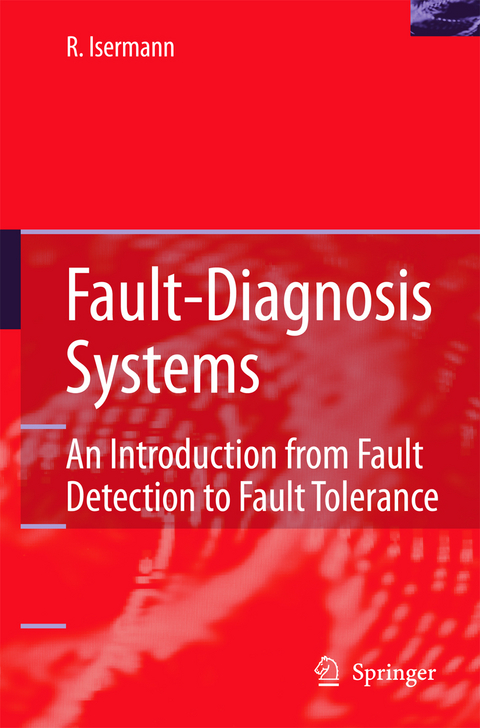
Fault-Diagnosis Systems
Springer Berlin (Verlag)
978-3-540-24112-6 (ISBN)
With increasing demands for efficiency and product quality and progressing integration of automatic control systems in high-cost mechatronic and safety-critical processes, the field of supervision (or monitoring), fault detection and fault diagnosis plays an important role.
The book gives an introduction into advanced methods of fault detection and diagnosis (FDD). After definitions of important terms, the reliability, availability, safety and systems integrity of technical processes is considered. Then fault-detection methods for single signals without models like limit and trend checking and with harmonic and stochastic models, like Fourier analysis, correlation and wavelets are treated. This is followed by fault detection with process models using the relationships between signals like parameter estimation, parity equations, observers and principal component analysis. The treated fault-diagnosis methods include classification methods from Bayes classification to neural networks with decision trees and inference methods from approximate reasoning with fuzzy logic to hybrid fuzzy-neuro systems.
Especially for safety-critical processes fault-tolerant systems are required. Basic redundant structures like n-out-of-m systems, cold and hot standby are considered and ways to design fault-tolerant sensors, actuators and control systems are outlined.
Several practical examples for fault detection and diagnosis of DC motor drives, a centrifugal pump, automotive suspension and tire show applications.
Prof. Dr.-Ing. Rolf Isermann leitet das Fachgebiet Regelungstechnik und Prozessautomatisierung im Institut für Automatisierungstechnik der TU Darmstadt. Seine Arbeit für die Mechatronik wurde mit dem Top Ten Award des renommierten MIT (Massachusetts Institute of Technology ) ausgezeichnet.
Fundamentals.- Supervision and fault management of processes - tasks and terminology.- Reliability, Availability and Maintainability (RAM).- Safety, Dependability and System Integrity.- Fault-Detection Methods.- Process Models and Fault Modelling.- Signal models.- Fault detection with limit checking.- Fault detection with signal models.- Fault detection with process-identification methods.- Fault detection with parity equations.- Fault detection with state observers and state estimation.- Fault detection of control loops.- Fault detection with Principal Component Analysis (PCA).- Comparison and combination of fault-detection methods.- Fault-Diagnosis Methods.- Diagnosis procedures and problems.- Fault diagnosis with classification methods.- Fault diagnosis with inference methods.- Fault-Tolerant Systems.- Fault-tolerant design.- Fault-tolerant components and control.- Application Examples.- Fault detection and diagnosis of DC motor drives.- Fault detection and diagnosis of a centrifugal pump-pipe-system.- Fault detection and diagnosis of an automotive suspension and the tire pressures.
| Erscheint lt. Verlag | 13.10.2005 |
|---|---|
| Zusatzinfo | XVIII, 475 p. |
| Verlagsort | Berlin |
| Sprache | englisch |
| Maße | 155 x 235 mm |
| Gewicht | 745 g |
| Themenwelt | Technik ► Elektrotechnik / Energietechnik |
| Schlagworte | Actuator • Analysis • Complexity • Condition Monitoring • fault detection • Fault Diagnosis • Fault-Tolerant Systems • Fehlererkennung • Fehlererkennung / Troubleshooting • fuzzy • Fuzzy Logic • Modeling • Monitoring • Process Automation • Quality Control, Reliability, Safety and Risk • Safety • Sensor • Signal • Supervision • Trend • Wavelet |
| ISBN-10 | 3-540-24112-4 / 3540241124 |
| ISBN-13 | 978-3-540-24112-6 / 9783540241126 |
| Zustand | Neuware |
| Haben Sie eine Frage zum Produkt? |
aus dem Bereich



